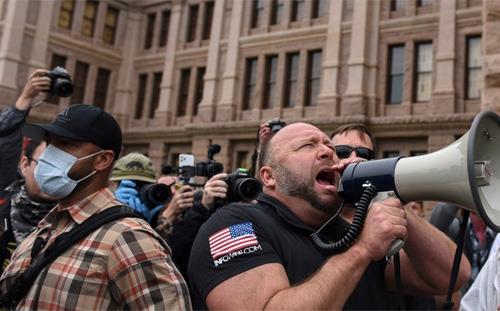
Conspiracy theories have long been lurking out there, stirring our emotions.
We've seen the Kennedy-assassination ideas of Oliver Stone and others; we've had UFO tales, billed as fiction (X-Files) or fact. Earlier, Joe McCarthy insisted he held the names of 205 Communist conspirators in the U.S. government.
Often, those views are nudged aside. But now, some viewers will have seen two major documentaries on the topic: CNN's Fareed Zakaria presented Donald Trump's Conspiracy Theories (still available via CNNgo), and at 10 p.m. ET, Tuesday (check local listings), PBS' Frontline has United States of Conspiracy.
Why the fresh coverage? Timothy Naftali – a historian who has written books on leaders (Kennedy, Khrushchev, George H.W. Bush) and has run the Nixon library – had a short answer for CNN: "This is the first time…that a conspiracy theorist holds the highest office in the land."
Still, Donald Trump's fondness for such theories is only the final touch in an already soaring trend. Other reasons range from the Internet and social media in general to Alex Jones (top, with megaphone) in particular.
Jones is a conspiracy fireballer at the extreme. He talked of the "Bush crime family, called Hillary Clinton "one of the most vicious serial-killers the world has seen," said all the major attacks (Oklahoma City in 1995, World Trade Center in both 1993 and 2001) were planned by our government, and even said the Sandy Hook school shooting in 2012 was faked, using actors.
He has been despised by many officials and approved by Trump. "Your reputation is amazing," the then-candidate said in 2015 on Jones' show. "I will not let you down."
In another era, Jones might have gone unnoticed. In Austin, Texas, he did a public-access TV show, and then a syndicated radio show, which lost two-thirds of its stations after he accused the government of bombing its people.
But that was just as the Internet and social-media were growing, and he was a perfect fit for both.
"The object is always to get clicks and get eyeballs," Morgan Pehme, director of Get Me Roger Stone, says in the PBS film.
Jones got them with wild claims, Pehme says; "you always have to top yourself." He stoked fears and then sold survival kits, bulletproof vests, even (until the FDA stopped him) pills that claimed to get rid of SARS and COVID. He got "all this money," Violet Jones, his ex-wife, says in the PBS film, "and Alex just wanted more and more and more."
Stone – the self-described political "trickster" – enjoyed being on the show and kept returning then convinced Trump to be a guest. After the election, Jones' rhetoric grew even stronger.
He said Trump's opponent had a child sex ring in the basement of a pizza place in Washington, D.C.: "When I think of the children Hillary Clinton has personally murdered and chopped up."
One believer took that seriously. He drove to Washington, barged into the restaurant, and fired two shots. "There were no abused children," Zakaria says in the CNN film. "Not even a basement."
Trump has also been a believer, including Jones' claim that 2016 had three million illegal voters. "I won the popular vote, if you (subtract) the people who voted illegally," Trump said.
The actual number is well below three million, Carol Anderson, an Emory University professor, says in the CNN film. One study, from 2000 to 2014, found "31 cases of voter impersonation fraud."
There have been many cases of Jones' impact. "It is surreal," he said on his show, "to talk about issues on the air and then two days later hear Trump say that word-for-word."
That was no exaggeration, Ron Jacobson (a former Jones staffer) says in the PBS film. "Sometimes it was, like, verbatim. Like, really Trump, really? You're taking his word for it?'"
There have been repercussions. YouTube and other channels banned Jones. He's been sued often and settled with Sandy Hook survivors after a court deposition in which he said he has "almost a full psychosis," which makes him believe things are true.
But he continues on the Internet, as do others – including QAnon, which alleges grand plots against the president.
Zakaria said that on July 4, Trump retweeted 14 QAnon-related messages. And we now know that on July 27, Twitter banned 7,000 QAnon accounts after determining they were promoting unfounded conspiracy theories.
Are the attempts to shorten the line between fringe and mainstream gaining traction?